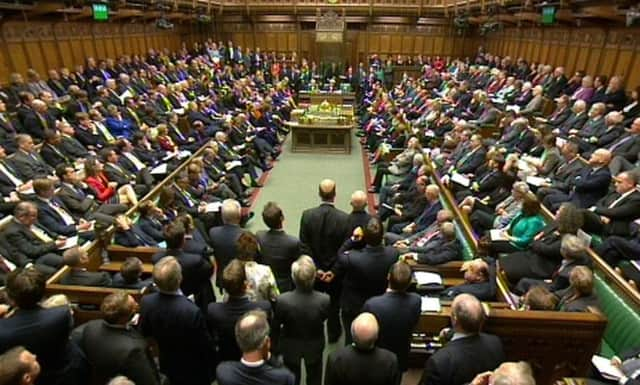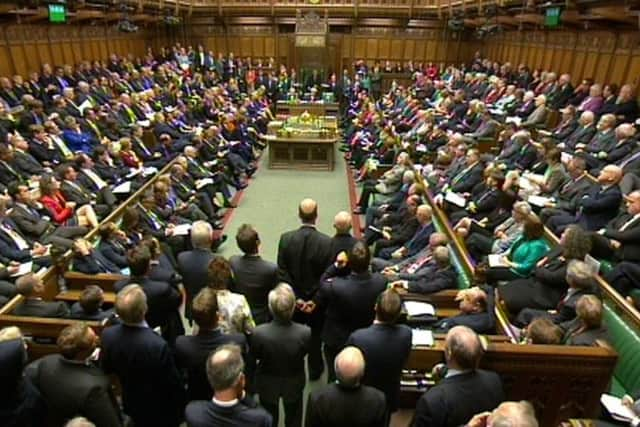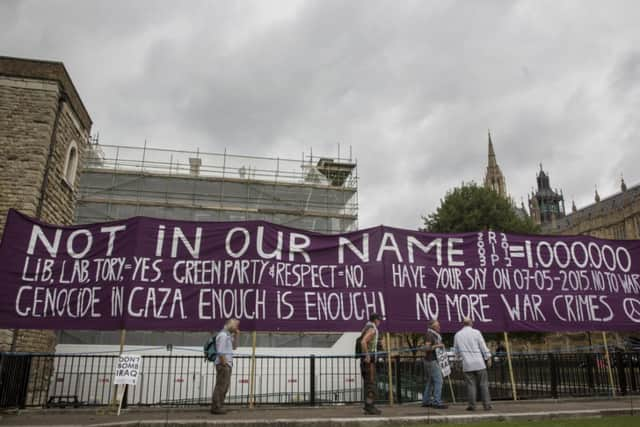MPs back British air strikes against Islamic State


Air strikes are limited to operations in Iraq – where the Baghdad government has asked for support – and not Syria. There was also a condition of no combat troops being deployed on the ground.
The United States and five Arab allies, including Saudi Arabia and the United Arab Emirates, have in recent days carried out some 200 strikes on the Islamic State (IS), also known as Isis and Isil.
Advertisement
Hide AdAdvertisement
Hide AdPrime Minister David Cameron yesterday warned: “This is going to be a mission that will take not just months but years, but I believe we have to be prepared for that commitment.”


With noisy anti-war protests outside parliament, opponents of military action inside included the SNP, which warned the vote gave an “open-ended commitment” to military action “with no plan”.
Six Tornado GR4 jets manned by two crew and armed with Brimstone missiles were on standby last night at RAF Akrotiri in Northern Cyprus.
They were due to be joined by other fighter jets from RAF Marham in Norfolk in the next 24 hours, while yesterday Nato allies from Denmark and Belgium also approved action against IS.
However, amid accusations of what was described as “mission creep”, Mr Cameron made it clear he will go beyond his parliamentary mandate and expand Britain’s involvement into Syria if he thinks the UK has to react to a major humanitarian crisis.


He also made it clear that he was willing to put boots on the ground to help train the Iraqi army and Kurdish forces, as well as provide specialist non-
combat assistance.
Following interventions from Tory former foreign minister Alistair Burt and Labour former Northern Ireland secretary Peter Hain, Mr Cameron made it clear that he is willing to order strikes in Syria and ask for permission from MPs later.
He said: “If there was the need to take urgent action to prevent, for instance, the massacre of a minority community or a Christian community, and Britain could act to prevent that humanitarian catastrophe, I am saying I would order that and come straight to the House and explain afterwards.” However, he admitted that the legal case for intervention in Syria is “more complicated”.
Advertisement
Hide AdAdvertisement
Hide AdLabour leader Ed Miliband, who backed the government motion, urged Mr Cameron to take any expansion into Syria to the United Nations first – even though the US is already carrying out air strikes there.
The Respect MP George Galloway, one of the leading opponents of the Iraq invasion in 2003, said: “We have mission creep even before the debate is finished”.
He added that there is “already consensus that there will be air strikes in Syria and boots on the ground”. However, in his appeal to MPs, Mr Cameron said that “this is not a walk-on-by” situation which Britain could ignore.
He said the UK has “a moral duty” to intervene in Iraq and that national security in Britain is at stake.
He pointed to the murder by IS of the Scottish hostage David Haines, its threat to kill two other British captives, journalist John Cantlie and aid worker Alan Henning, and a number of terrorist attacks and plots against Britain and other Western nations.
He said: “Left unchecked, we will face a terrorist caliphate on the shores of the Mediterranean, bordering a Nato member, with a declared and proven determination to attack our country and our people.
“This is not the stuff of fantasy – it is happening in front of us and we need to face up to it.”
He warned that future prime ministers will come back to the Commons and ask permission to tackle Islamic extremists in what he described as “a generational struggle”.
Advertisement
Hide AdAdvertisement
Hide AdWith some unease in the chamber and around the country of going to war in Iraq, 11 years after the controversial 2003 invasion, Mr Miliband insisted “we cannot simply stand by” against the threat of IS.
He said: “I understand the qualms and, for some, deep unease that there will be about this undertaking both in this House and in the country.
“Those who advocate military action today have to persuade members of this House not just that Isis is an evil organisation but that it is we, Britain, who should take military action in Iraq.”
But his call for a UN resolution was described as “pointless” by former Lib Dem leader Sir Menzies Campbell.
Sir Menzies said: “It has been suggested we need a United Nations resolution before we could embark on anything of the kind now proposed in relation to Syria.
“You have to accept the reality that the prospect of a United Nations Security Council resolution is totally remote. Even putting one on the table would be a wholly pointless exercise because of the attitude undoubtedly to be taken by Russia and possibly also by China.”
Former defence secretary Liam Fox added: “There is a clear legal case to attack Isil bases in Syria and I’m afraid sooner or later we are going to have to do it. It would be far better if we had said so explicitly.”
Labour Neath MP Peter Hain said IS fighters would “disappear across an invisible border” into Syria.
Advertisement
Hide AdAdvertisement
Hide AdLabour Islington MP Jeremy Corbyn said the government was exercising double standards over human rights as Britain’s ally Saudi Arabia regularly beheads people.
Former Cabinet minister Kenneth Clarke suggested that Britain’s military contribution would be “almost symbolic”.
SNP Westminster leader and defence spokesman Angus Robertson said his party would oppose the motion despite its “revulsion” over the tactics of IS.
He said: “The motion asks for a green light for military action which could last for years. There is no commitment for post-conflict resolution.”
Inverclyde MP Iain McKenzie was sacked from the Labour shadow defence team for voting against the motion.